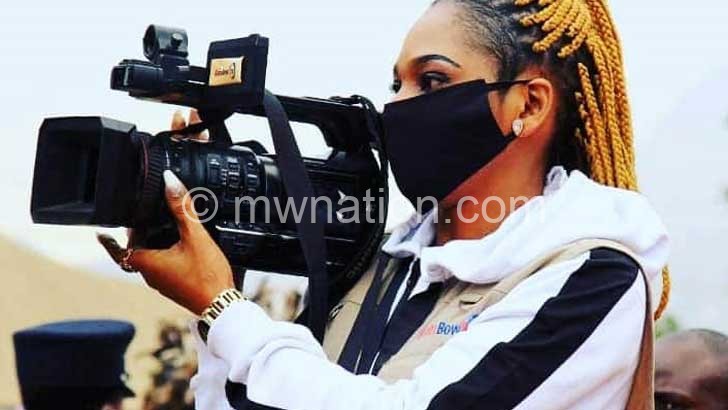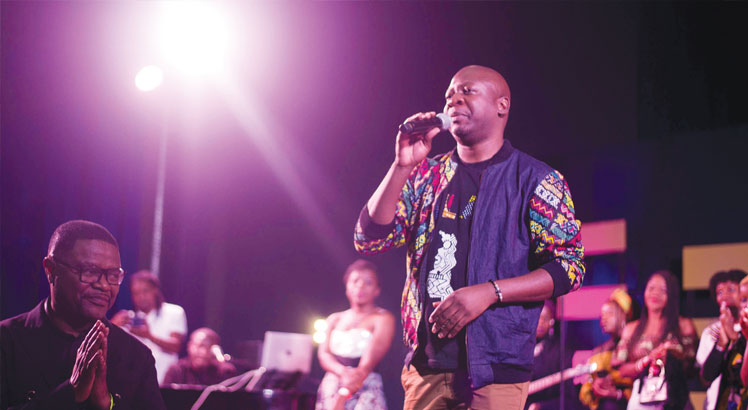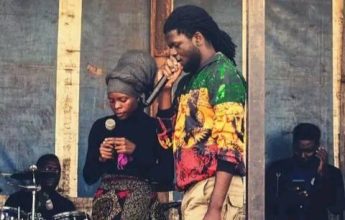Esther’s bold video lens
The past two decades has seen an increase in the number of local television stations that broadcast multifaceted content in the country.
This increment has equally led to growth in the number of videographers
Sadly, the industry continues to be dominated by men with most females in this art being confined to presenting and acting roles.
However, Blantyre-based Esther Dekhani Banda is one of the few women making strides in the art of telling stories through motion pictures.
Banda, who is currently working as a cameraperson and video editor at privately-owned Rainbow Television, says her interest was inspired by the exposure to cameras which her father owned and used.
She said: “While growing up in Mponela, Dowa District, my father used to own cameras, and he would take pictures or videos of his children and relatives. This built curiosity in me to understand and operate the camera one day.

“Upon seeing women operating such equipment on South Africa’s Super Sport channel, the interest grew bigger, and I knew it was possible for me to become a cameraperson in Malawi.”
Banda says the journey to achieve her dream faced a lot of resistance because her parents thought it could not work for her in Malawi since the industry is male-dominated.
“My desire was to pursue a career in the media. However, upon completion of my secondary school studies at Madisi Secondary School, I went to Polokwane in South Africa where I studied business administration and secretarial studies because my parents could not buy the idea of me pursuing a career in videography,” she explains.
Despite having administrative qualifications, when she returned to Malawi in 2011, Banda enrolled for a certificate in journalism at Malawi Institute of Journalism. The studies helped her to acquire knowledge in video shooting and editing.
Banda who was nicknamed the ‘She-Drone’ by her workmates due to her captivating shots during productions, expressed joy on the acceptance she has gained in the industry this far.
She says: “It is not easy to be a woman in this industry, you will rarely see a female cinematographer at an event in Malawi, I am one of the very few ladies operating in this industry.
“I am grateful to male veteran camerapersons Tafique Chipinga and Ian Ndenge for they believed in me from the onset, they continuously polished my skills, guided and encouraged me to become better at telling video stories.”
The dream which was almost buried in infancy due to prescribed societal gender roles has seen Banda win awards and her clips gaining airplay on reputable international news channels.
“I have had a fulfilling career, I won the 2019 TNM Best Videographer/Photojournalists of the season award out of the 98 entries that experienced videographers submitted, aside being voted employee of the year at Rainbow Television,” she says.
In addition, at the peak of the anti-Jane Ansah demonstrations led by the Human Rights Defenders Coalition, Banda captured unique real time footage which attracted the interest of international television stations.
“BBC and Aljazeera sought my permission to play the footage on their channels which they did. A great mark of my career,” she states.
Renowned videographer Peter Mazunda commends the coming in of women in videography, claiming it signals growth.
He says: “It is a welcome development to see women like Esther stretching themselves to pick up technical but creative roles like videography, video editing and animation.
“This is a sign that the industry is growing for the better, and soon the gender imbalance that exists on such positions in television houses will be destroyed.”
Banda plans to open a centre where she can impart her videography and multimedia production skills onto the youth, mainly girls, as way of empowering them to become independent.





